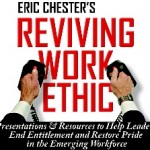What’s wrong with work ethic in America?
This is a question that my good friend in-demand keynote speaker Eric Chester is answering for his corporate and assocation clients. They asked him so often he realized this HAD to be his new book. He has given me permission to post a segment to give my readers a taste. Hope you enjoy.

The decline of work ethic is not uniquely an American problem, but one that is affecting all Western nations and a growing number of those in the East. However, if we examine the American workplace today with a comparable example from the 1930s, 1960’s, or even the 1990’s, it’s easy to see that America has lost sight of the virtues that comprise work ethic—the very things that helped build our country.
The pursuit of happiness and the American Dream drove progress and innovation, but they came with unintended side effects. In many cases, for instance, healthy ambition has morphed into avarice. Urbanization and an emphasis on large-scale businesses means fewer and fewer kids are learning about work in the natural course of family life.
Technological advances that make life faster, more fun, more entertaining, and easier to navigate are also consuming our time and energy while eliminating avenues for learning vital concepts about work. And pop psychologists have pushed parents to focus on building self-esteem in their children, creating at least two generations of me-centric workers. No wonder so many employers are use terms like entitled, disengaged, unmotivated, and disloyal when describing their current workforce and potential labor pool.
Are leaders really struggling with work ethic-deficient employees?
Pull any employer to the side and ask them to describe, in general, the work ethic that they see represented throughout their ranks and your apt to hear some colorful language. Even the eternally optimistic warm and fuzzy managers wince a bit when the term work ethic enters the dialogue. I interact with thousands of leaders, managers, business owners and execs each year and I’ve yet to find any who believe that the work ethic represented in the current labor pool stands up to that of the labor pool twenty, ten—or even five years ago. These same employers, however, will openly lament the prevailing entitlement mentality of the emerging workforce that many decry is contagious, now rampant among X’ers and even baby boomers.
Which generation of workers is having the most trouble with their work habits and why?
America’s emerging workforce—those in the sixteen-to-twenty-four age bracket—bring some amazing skill sets and personality traits into the labor pool. The challenge is that Millennials don’t always want to work, and when they do, their terms don’t always line up with those of their employers. All too often, the young worker shows up ten minutes late wearing flip-flops, pajama bottoms, and a T-shirt that says “My inner child is a nasty bastard.” Then she fidgets through her shift until things slow down enough that she can text her friends or update her Facebook page from her smartphone.

All too often, these bright and ambitious recruits see work as something to avoid or as a necessary evil to endure prior to winning the lottery, landing a spot on a reality television show, or getting a cushy, high-paying job with a corner office and an expense account.
Before you write this off as unfair stereotyping, consider what millennial workers had to say about themselves and their peers.
In February 2010, the Pew Research Center released an extensive report titled “Millennials: A Portrait of Generation Next” that proves this generation doesn’t identify with work ethic. The Pew research found that 61 percent of Millennials say their generation has a “unique and distinctive identity.” That’s about the same percentage you’ll find for other generations, but what’s different are the things Gen Y sees as its distinctive qualities.
In an open-ended follow-up question—“What makes your generation unique?”—work ethic was mentioned as a distinctive characteristic by at least 10 percent in the three older generations—Gen X (ages thirty to forty-five), Baby Boomers (ages forty-six to sixty-four), and the Silent Generation (ages sixty-five and up). That put it among the top five responses for those generations, and it was number one for Baby Boomers. It didn’t make the list for Millennials. Millennials said that what made them unique was technology use, music/pop culture, liberal/tolerant beliefs, greater intelligence, and clothes.
Why is it that younger workers are being described with the term ‘entitled?’ And why are having such a hard time acclimating to a traditional work environment?
They’ve grown up in a world where most people work hard to find ways of avoiding hard work. They’ve heard stories telling how lottery winners, day traders, bloggers, dot-commers, and Internet marketers have managed to beat the system and derive a huge bounty with little or no effort. They’ve been inundated with reality television that turns talentless fools into millionaires in the blink of an eye and with the greatest of ease.
The impact of this value programming has created a mindset shift. Work is no longer the primary source of personal pride, but rather something to disdain, to shortcut, or to elude altogether. In a perpetual quest to separate effort from reward, the average employee is less concerned about the value they can provide to their employers and more concerned about what they can get from them.
If you were speaking to a disengaged or disenfranchise worker, what advice would you give them to motivate them to give their best?
1. Do whatever is within your control to eliminate the things that demotivate you. For example, when you’re choosing who to go to lunch with or hang out after work with, surround yourself with coworkers who enjoy their job as opposed to those “Debbie Downers” who are always complaining about the boss, the company, etc. If the break room makes you feel like you are in a jail cell, volunteer to come in on your day off and repaint it or bring in some table games, or posters, or music, etc. In other words, take steps to create a more positive space for you to operate.
2. Get out of the mindset that ‘work sucks’ or that ‘you’re stuck’. This is a free country and no one is making you work where you do. No matter who you are, what skills you currently have, or what you do to earn your daily bread, you have options. You can work harder and perform better in an attempt to get a promotion. You can use your off work time to take classes or improve your skills to move up in your present company or to become more hirable to another. You are in control of your career, so don’t allow yourself to develop a defeatist attitude or you will end up stuck, or worse, fired.
3. Work like you’re showing off. Approach your next shift as if your every move is being video audience and that your parents, kids, friends, and future employers are all tuned-in. If you perform your normal job as you would under these conditions for an entire day, it would be impossible to feel down and disengaged. In fact, it will be impossible for your employers not to notice you. Very soon, you will be the very best at your job, and once you are, you will be promoted, you will see a dramatic increase in your pay, and you will be sought out by other employers. When you are the best at your job, your future is unstoppable.
Is it possible to work hard if you hate your job? Why or why not?
Passion doesn’t fuel work ethic; work ethic fuels passion.
Most people want to go about it backwards. They want to let their passions propel their efforts. They want an emotion-driven life, but our emotions don’t always lead us where we need to go or keep us where we need to be.
You won’t produce heat in your fireplace by saying, “Once there’s a fire, I’ll put in some logs.” You put the logs in and build a fire, and then you’ll see some heat. Likewise, the passion you have for a job is directly related to the initiative you put into it. Many highly successful people in all walks of life have discovered that because they put a great amount of effort into their job, their job eventually becomes their passion. They didn’t set out to be the world’s greatest carpet installer, data entry clerk, or fry cook; they just set out to be the best they could be while in their jobs, and the next thing they knew they were awesome at it!
If a young worker says, “I don’t have a passion for selling shoes,” the first thing he needs to do is show some initiative by making selling shoes a short-term passion. If he throws himself into it, does all he can to learn the business and make himself the best, and he still doesn’t develop a passion for the job, that’s fine. He has still improved his reputation for adding value to a job, made himself more hirable, and developed his work ethic in the process. And then he can do his boss and himself a favor and quit. She’ll likely give him a good reference or help him find another position within the organization.
What are your seven components of work ethic?
Over the past ten years, I’ve interacted with, listened to, and surveyed more than 1,500 employers (business owners, C-level executives, HR professionals, managers, supervisors, etc.) in an attempt to understand what work ethic looks like from their perspective. In each exchange, I listened to their various laments about that lack of work ethic and responded by asking this question:
“What do you expect from each and every employee?”
At the risk of sounding simplistic, I can summarize hundreds of responses in one sentence:
Employers are searching for positive, enthusiastic people who show up for work on time, who are dressed and prepared properly, who go out of their way to add value and do more than what’s required of them, who are honest, who will play by the rules, and who will give cheerful, friendly service regardless of the situation.
There are no negotiables in this summation. By that I mean that there isn’t any one of the seven core work ethic values represented above to which you, as a leader, don’t personally aspire and hold yourself accountable. Likewise, you expect these same core values to be evident in everyone you work for, work with, and oversee.
We can shorten the summation by defining each value with these seven terms: attitude, reliability, professionalism, initiative, respect, integrity, and gratitude.
Hope you enjoyed that and found it helpful. If you want to talk to Eric Chester about his work or book “Reviving Work Ethic: A Leader’s Guide to Ending Entitlement and Restoring Pride in the Emerging Workforce” (Greenleaf 2012). He is also the Founder and CEO of The Bring Your A Game to Work program. He can be reached at 303-239-9999 or through www.RevivingWorkEthic.com
